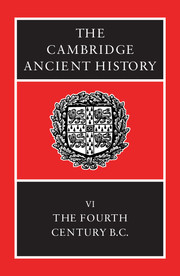Book contents
- Frontmatter
- 1 Sources and their uses
- 2 Sparta as victor
- 3 Persia
- 4 The Corinthian War
- 5 Sicily, 413–368 B.C.
- 6 The King's Peace and the Second Athenian Confederacy
- 7 Thebes in the 360s B.C.
- 8 Regional surveys I: Persian lands and neighbours
- 9 Regional surveys II: the West and North
- 9a Carthage from the battle at Himera to Agathocles' invasion (480–308 B.C.)
- 9b South Italy in the fourth century B.C.
- 9c Celtic Europe
- 9d Illyrians and North-west Greeks
- 9e Thracians and Scythians
- 9f The Bosporan Kingdom
- 9g Mediterranean communications
- 10 Society and economy
- 11 The polis and the alternatives
- 12 Greek culture and science
- 13 Dion and Timoleon
- 14 Macedon and north-west Greece
- 15 Macedonian hegemony created
- 16 Alexander the Great Part 1: The events of the reign
- 17 Alexander the Great Part 2: Greece and the conquered territories
- 18 Epilogue
- Chronological Table
- BIBLIOGRAPHY
- Index
- Map 1: Greece and Western Asia Minor
- Map 9: Egypt
- Map 20: Alexanders campaigns
- References
9e - Thracians and Scythians
from 9 - Regional surveys II: the West and North
Published online by Cambridge University Press: 28 March 2008
- Frontmatter
- 1 Sources and their uses
- 2 Sparta as victor
- 3 Persia
- 4 The Corinthian War
- 5 Sicily, 413–368 B.C.
- 6 The King's Peace and the Second Athenian Confederacy
- 7 Thebes in the 360s B.C.
- 8 Regional surveys I: Persian lands and neighbours
- 9 Regional surveys II: the West and North
- 9a Carthage from the battle at Himera to Agathocles' invasion (480–308 B.C.)
- 9b South Italy in the fourth century B.C.
- 9c Celtic Europe
- 9d Illyrians and North-west Greeks
- 9e Thracians and Scythians
- 9f The Bosporan Kingdom
- 9g Mediterranean communications
- 10 Society and economy
- 11 The polis and the alternatives
- 12 Greek culture and science
- 13 Dion and Timoleon
- 14 Macedon and north-west Greece
- 15 Macedonian hegemony created
- 16 Alexander the Great Part 1: The events of the reign
- 17 Alexander the Great Part 2: Greece and the conquered territories
- 18 Epilogue
- Chronological Table
- BIBLIOGRAPHY
- Index
- Map 1: Greece and Western Asia Minor
- Map 9: Egypt
- Map 20: Alexanders campaigns
- References
Summary
THE FOUNDING RULERS OF THE ODRYSIAN KINGDOM – TERES AND SITALCES
Following the three and a half decade occupation of its southern flanks by Persian troops, the post-war history of Thrace in the fifth century is marked by a rapid development of tribal political power, with the emergence of elite military hierarchies, distinct regional centres of authority and the assumption of regular political and trading relations with Greek cities. Precisely what role the Persian campaigns played in this crystallization is disputable. The scarcity of contemporary literary references makes it difficult to assess the chronological relationship between given tribal entities and specific geographical regions. Nor is it easy to integrate historical facts with the archaeological material, which becomes increasingly more abundant from the second quarter of the fifth century onwards.
The most significant tribal group to emerge on the international stage was that of the Odrysians. Much of what is known of the founder of their ruling dynasty, Teres (Thuc. II.29.2–3) is anecdotal, whether it be his longevity (Lucian Macr. 10) or the rustic character of his preferred lifestyle (Plut. Mor. 174 D). The only detailed incident recorded from his reign, a surprise night attack by the Thyni during which Teres was deprived of his baggage train and his troops suffered heavy losses, is reported in the reminiscences of a later ruler, Seuthes II (Xen. An. VII.2.22). The dates and duration of Teres’ reign are unknown and Thucydides does not make it clear whether it was he or his son Sitalces who extended Odrysian power towards the Aegean on the south and the Danube on the north (II.29.2; Diod. XII.50.1).
- Type
- Chapter
- Information
- The Cambridge Ancient History , pp. 444 - 475Publisher: Cambridge University PressPrint publication year: 1994
References
- 5
- Cited by

